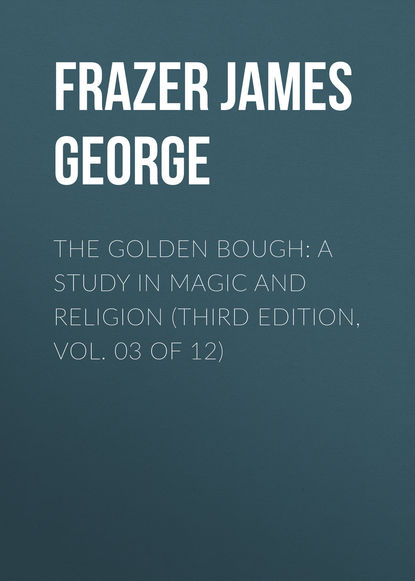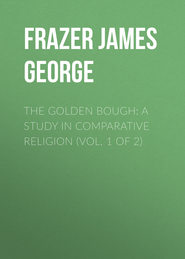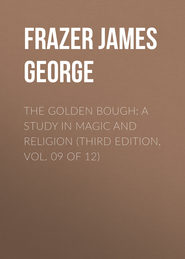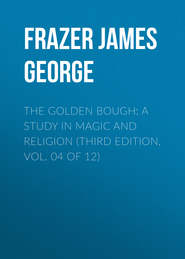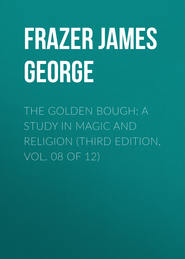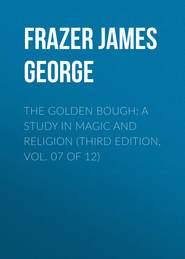По всем вопросам обращайтесь на: info@litportal.ru
(©) 2003-2024.
✖
The Golden Bough: A Study in Magic and Religion (Third Edition, Vol. 03 of 12)
Настройки чтения
Размер шрифта
Высота строк
Поля
943
A. Krause, Die Tlinkit-Indianer (Jena, 1885), p. 300.
944
Petronius, Sat. 104.
945
J. G. Campbell, op. cit. pp. 236 sq.
946
A. Bastian, Die deutsche Expedition an der Loango-Küste, i. 231 sq.; id., Ein Besuch in San Salvador, pp. 117 sq.
947
P. B. du Chaillu, Explorations and Adventures in Equatorial Africa (London, 1861), pp. 426 sq.
948
O. Baumann, Usambara und seine Nachbargebiete (Berlin, 1891), p. 141.
949
A. Junod, Les Ba-Ronga (Neuchâtel, 1898), pp. 398-400.
950
W. Stanbridge, “On the Aborigines of Victoria,” Transactions of the Ethnological Society of London, N.S., i. (1861) p. 300.
951
A. C. Hollis, The Nandi (Oxford, 1909), pp. 30, 74 sq.
952
Le P. A. Jaussen, Coutumes des Arabes au pays de Moab (Paris, 1908), pp. 94 sq.
953
2 Samuel, x. 4.
954
2 Samuel, x., xii. 26-31.
955
R. Torday and T. A. Joyce, “Notes on the Ethnography of the Ba-Yaka,” Journal of the Anthropological Institute, xxxvi. (1906) p. 49.
956
François Pyrard, Voyages to the East Indies, the Maldives, the Moluccas, and Brazil, translated by Albert Gray (Hakluyt Society, 1887), i. 110 sq.
957
E. Shortland, Traditions and Superstitions of the New Zealanders, p. 110.
958
J. S. Polack, Manners and Customs of the New Zealanders, i. 38 sq. Compare G. F. Angas, Savage Life and Scenes in Australia and New Zealand (London, 1847), ii. 108 sq.
959
James Wilson, A Missionary Voyage to the Southern Pacific Ocean (London, 1799), p. 355.
960
R. A. Freeman, Travels and Life in Ashanti and Jaman (Westminster, 1898), pp. 171 sq.
961
E. Young, The Kingdom of the Yellow Robe, p. 79.
962
Aulus Gellius, x. 15. 15. The ancients were not agreed as to the distinction between lucky and unlucky trees. According to Cato and Pliny, trees that bore fruit were lucky, and trees which did not were unlucky (Festus, ed. C. O. Müller, p. 29, s. v.Felices; Pliny, Nat. Hist. xvi. 108); but according to Tarquitius Priscus those trees were unlucky which were sacred to the infernal gods and bore black berries or black fruit (Macrobius, Saturn, ii. 16, but iii. 20 in L. Jan's edition, Quedlinburg and Leipsic, 1852).
963
Pliny, Nat. Hist. xvi. 235; Festu, p. 57 ed. C. O. Müller, s. v.Capillatam vel capillarem arborem.
964
M. Quedenfelt, “Aberglaube und halbreligiöse Bruderschaft bei den Marokkanern,” Verhandlungen der Berliner Gesellschaft für Anthropologie, Ethnologie und Urgeschichte, 1886, p. (680).
965
A. Wuttke, Der deutsche Volksaberglaube,
pp. 294 sq., § 464.
966
W. Mannhardt, Germanische Mythen (Berlin, 1858), p. 630.
967





